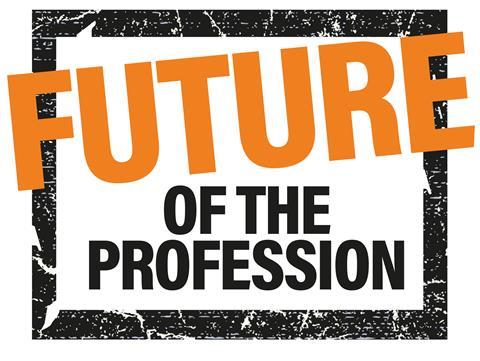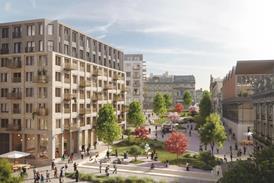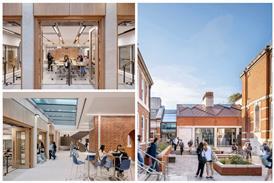Former president says progressive candidate could hugely enrich the institute as nomination deadline looms

Change does not come easily at the RIBA. Lasting change of the kind necessary for the profession of architecture to become diverse, equitable, sustainable and prosperous was always going to be impossible under the old regime of governance.
This saw presidents come and go with various agendas, often at loggerheads with one another so that council, board and executive team were forever and ineffectually pulled this way and that. I was the last RIBA president under a system set up to fail – and that’s why we changed it.
Now the RIBA has a board of trustees chosen because they respectively represent a wide range of the necessary competences. Board members’ terms of office span the coming and going of elected presidents.
>> Also read: What’s going on at the RIBA?
So long as the board works well with the executive and in harmony with the wishes of council, there is a real chance of setting and delivering strategic goals. Crucially, while presidents elected by the membership get a seat on the board, they no longer have to chair it.
I write this as the candidates for the president to follow Simon Allford are due to be announced. Simon has done a good job, working with board chair Jack Pringle to champion some important initiatives, communicate the need for restructuring and especially to calm the fractious atmosphere that existed when he took office. Now, with the machinery of governance in place and operating more smoothly, there is a new and exciting opportunity.

Most candidates will say that they are concerned for the future of the profession, that they will represent the interests of the disadvantaged, the unvoiced concerns of the disenfranchised and powerless. But now that largely silent and disinterested constituency, the RIBA members who don’t vote because they do not see themselves represented among the candidates, can actually vote for one of their own.
Muyiwa Oki is a young, black, salaried architect. He has been selected to run following a rigorous hustings organised by Future Architects Front (FAF), The Section of Architect Workers (SAW) and others.
He is one of the disenfranchised who don’t turn out to vote because they could not care less about choosing between candidates whose lives are so far from their own experience that they might as well come from Mars.
Only Oki differs from the refuseniks in that he believes that he can make a difference - by being one of the normally disenfranchised but working within the organisation. He might well be right about that.
He deserves a chance to make his case among other runners who will be able to say that they have more organisational knowledge and expertise, more practice under their belt and more buildings to their name.

Oki’s opportunity lies in the possibility of galvanising his constituency and, if his campaign succeeds in that, he will have hugely enriched the institute. Think of all those salaried employees whose subscriptions are paid for by employers to make up the minimum numbers necessary to qualify as chartered practices. Think of the students who were not even eligible to vote for the president when I was in office. Oki could bring them out to vote in numbers.
If they do, and in sufficient number for Oki to win, it won’t just be a symbolic victory. A new cohort of diverse young voters with an interest in the outcome of the election is just the injection of lifeblood the institute needs.
And, in office, Oki will be able to call it out in a way that his older, more experienced opponents cannot. There is nothing more effective than someone arguing from lived experience to make the rest of us sit up and take notice.
Talk to Oki and his passions soon become clear – a better deal for Part Is, IIs and young salaried architects, a more meaningful response to the climate crisis in the industry, driving next-generation variety of thought, practice and technology, and of course effective action on equality, diversity and inclusion, which is still woefully absent.
If he can communicate these imperatives effectively to a normally indifferent electorate, he will have no trouble carrying his mandate as victorious candidate to press the RIBA council and board to act on them. And just imagine how refreshing it would be to see someone speak for architecture to members, the public and policymakers as a representative of the future of the profession.
I urge RIBA members, especially those who do not normally turn out to vote: just listen to what Muyiwa Oki has to say.
RIBA elections
Current chartered members of RIBA and honorary fellows are eligible to stand for RIBA pPresident. The successful candidate will take up office as president-elect from 1 September for one year, and will then serve as RIBA president for a two-year term beginning on 1 September 2023.
The nominations period will close at 5pm on 14 June. By that time, completed nominations must be received by Civica through the online elections portal.
The full list of candidates will be announced on 20 June. Voting opens on 28 June until 26 July and the results of the election will be revealed on 2 August.
















3 Readers' comments